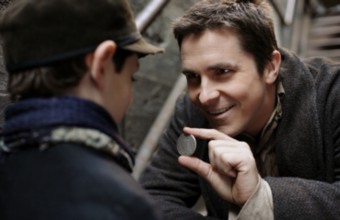Rupert Angier (Hugh Jackman): "Which hat is mine?" |
Nikola Tesla (David Bowie): "They are all your hats, Mr. Angier." |
A moment of severe genre shifting (or is it?)
for a drama set in the 1890s. |
Here
at Cine Outsider, reviewers don't skimp on detail unless
they have to sit through the unspeakable awful Shark
Tale. But this will deliberately be a capsule
review of a movie that is almost impossible to review without
actually talking about the film – hence my (forgive the
word-invention) capsularity. If I talk about the film I
will reveal things and having things revealed is not how
you want to approach The Prestige. It is
a magician's act of a movie and a tremendous example of
a film that suffers the more you know about it. But does
it?
If
you dip into and taste the wonderfully bizarre theories
cast by IMDB posters, (after you have seen it, please) the
film also demands repeated viewings to unravel multiple
interpretations. There seems to be a hinge at the point
of the viewer accepting a genre change in the last act,
or seeing that hinge too as an illusion. I can say no more
except see the movie! You'll be talking about it long after
the credits have verticaled north. In fact, as I drove home,
I was bombarded by a number of "Oh, if that was the
case then he had to…!" and "But if he had
to do that then that meant that...!" Not many movies
plant that many post-timed thought grenades in your skull
– all highly welcome.

The
talented director, Christopher Nolan spans genres and film-making
scale (from Memento to Batman
Begins) and has an unusual predilection for
time fractured drama. Memento was a tale
told backwards and very successfully so. The Prestige is a tale told in many timelines but it is a supreme compliment
to the director's skill that the various temporal strands
in which his tale is unravelled are crystal clear. I bet
there were a few nervous execs that felt that a subtitle
or two might have helped but all credit to the film-makers.
In fact even linearly told stories could benefit from this
much clarity.
Two
friends, both magician's aides in the late 1800s, vow to
become magicians themselves. One, Rupert Angier (played
charmingly by ex-blade fingered Hugh Jackman), is smooth,
happily married and a natural born showman. He's the one
of the two who sees the world and what the world wants to
see very clearly. But if he lacks anything, it is the intellectual
rigor that the success of his job requires. Fulfilling that
task is Michael Caine's Cutter, the Jonathan Creek, if you
will – the illusion builder. It's his explanation of the
title that opens the movie. There are three parts to a magician's
trick. The first, the Pledge, shows you something ordinary
that probably isn't. The Turn is the act of magic itself
(the disappearance, the drowning lady), the extraordinary
act. The Prestige is the result; the effect on the audience
and the resulting awe. The second magician, Alfred Borden
(played by Christian Bale) is the more secretive, the more
closed and definitely more Cockney. It becomes clear to
anyone with a brain that Borden's secret is (as Sight
and Sound said) insultingly obvious. But that's part
of the magic (if you will). That very act of smug deduction
is in itself the result of misdirection. Both men suffer
horrific personal losses and both men wage war on each other
via personal assaults (during performances) and the revelations
of diaries stolen by each and read by both as the movie
progresses.
In The Prestige, we are asked to believe that
two men would go to the very limits of human behaviour to
earn (or deceive to earn) that prestige. It is a tale about
obsession and it all starts after a terrible accident –
or was it an accident? Seriously, this is a movie that revels
in its twists and turns and if you delight in cinema as
a puzzle, you will devour The Prestige and love every throat contraction as it goes down...
|